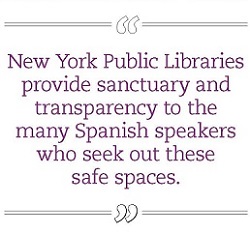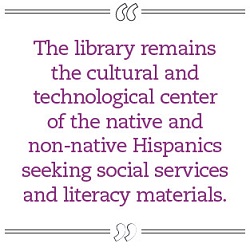Information Literacy and The Hispanic Community
Hispanics, curious about services offered for Spanish speakers, seek public libraries for paths to citizenship, assistance with employment and housing, and of course to ask, “¿Donde están los libros en español?"

Publishers and Librarians Shine Pathways for Spanish-Speaking Readers
 Hispanics, curious about services offered for Spanish speakers, seek public libraries for paths to citizenship, assistance with employment and housing, and of course to ask, “¿Donde están los libros en español?” Hispanic or otherwise, the librarian’s ability to connect with high-needs patrons is paramount to illuminating their path to information literacy. Publishing companies are making great strides at offering diverse choices to the Spanish-speaking community. Yet, even with publishers making more Spanish books readily available, how are librarians assessing community needs, enhancing their Spanish and bilingual collections, and making them accessible?
Hispanics, curious about services offered for Spanish speakers, seek public libraries for paths to citizenship, assistance with employment and housing, and of course to ask, “¿Donde están los libros en español?” Hispanic or otherwise, the librarian’s ability to connect with high-needs patrons is paramount to illuminating their path to information literacy. Publishing companies are making great strides at offering diverse choices to the Spanish-speaking community. Yet, even with publishers making more Spanish books readily available, how are librarians assessing community needs, enhancing their Spanish and bilingual collections, and making them accessible?
According to Instituto Cervantes, “the United States is the world’s second largest Spanish-speaking country after Mexico.” The U.S. has 41 million native speakers and 11 million who are bilingual. Librarians and the publishers who serve them are at the forefront of creating intuitive pathways to Spanish language and/or bilingual resources.
In this special section, “Information Literacy and the Hispanic Community: Publishers and Librarians Shine Pathways for Spanish-Speaking Readers,” Alex Manuel Pérez, a life-long learner and 25-year veteran serving the needs of second language learners and high-risk college students, explores the ambitions and challenges of publishers and librarians who serve Hispanic patrons.
Librarians interviewed for this article share their most valued and creative strategies for reaching the Hispanic reader. They unanimously agree that the local library provides sanctuary and transparency to the many Spanish speakers who seek out these safe spaces in new worlds. How are our Spanish-speaking patrons assessed and served? How do librarians close gaps between the native and second-language speaker? What are the greatest challenges librarians face in providing books in Spanish?

New York City librarians Adriana Blancarte-Hayward and Libbhy Romero gush about public libraries as places where “everyone can feel at home, and enjoy welcoming spaces filled with information that help all New Yorkers, native or foreign-born, to live, work, and thrive in New York City.” Seattle Public Libraries’ Helen Gutierrez and Rachel Martin’s collections teams “enhance and supplement already existing Spanish collections with e-audio books, e-books, and fotonovelas.” Each of the seventy-three Los Angeles libraries feature a New Americans Welcome Station, and six New Americans Centers have been opened to provide access to professional, qualified experts in citizenship and immigrant rights. Services like this bring in many new people who did not know about the library, according to Jimmy Tokeshi, Principal Public Relations Representative. Jo Anne Romero Huerta, representing the Dallas Public Library, leverages social media to “send out regular tweets for #DPLStaffReads geared toward Hispanics and Spanish speakers.”
These exemplary resources and innovations will only succeed in the hands of the populations they intend to serve. BookOps, the shared library technical services organization that serves the Brooklyn Public Library (BPL) and The New York Public Library (NYPL), has a World Languages Selection team, led by Libbhy Romero (World Languages Coordinator) and Alexandra Gomez (World Languages Selector). Every year, this team checks on demographic changes in the community by referring to different tools such as NYC Planning Community District Profiles and NYC Population FactFinder.
Findings fr om such data-driven assessment introduce Spanish-speaking readers to the latest fall 2018 Spanish titles from Vintage Español/Penguin Random House, including El escándalo del siglo by Gabriel García Márquez, a selection of his journalistic writings, and the phenomenally popular Lin Manuel Miranda’s new inspirational book, Buen día, buenas noches: Palábras de ánimo para mi y para ti.
om such data-driven assessment introduce Spanish-speaking readers to the latest fall 2018 Spanish titles from Vintage Español/Penguin Random House, including El escándalo del siglo by Gabriel García Márquez, a selection of his journalistic writings, and the phenomenally popular Lin Manuel Miranda’s new inspirational book, Buen día, buenas noches: Palábras de ánimo para mi y para ti.
Also this fall, Rayo/HarperCollins Español will publish ¿Sabes quien es? by Karin Slaughter, a stunning family tragedy and a hold-your-breath pedal-to-the-metal thriller magically blended by Slaughter’s trademark passion, intensity, and humanity. Matar a un ruiseñor (Novela Gráfica) by Harper Lee is another Rayo/HarperCollins Español title, a beautifully crafted graphic novel adaptation of Harper Lee’s beloved, Pulitzer-prize winning American classic, To Kill a Mockingbird.

Harper Collins Christian Publishing is also excited to introduce Esperanza inconmovible (Unshakable Hope) by Max Lucado. This New York Times best seller unpacks 12 of the Bible’s most significant promises, equipping you to overcome difficult circumstances by keeping your focus on the hope found in the promises of Scripture rather than dwelling on the problems in front of you. Another title from Harper Collins Christian this autumn is Gozo desafiante (Defiant Joy) by Stasi Eldredge. In Defiant Joy, Stasi Eldredge invites us with courage, candor, and tender vulnerability to a place beyond sadness or happiness. She shows us how to maintain a posture of holy defiance that neither denies nor diminishes our pain but dares to live with expectant, unwavering hope. In Su dinero, su matrimonio (Your Money, Your Marriage), Brian and Cherie Lowe offer straight talk and power principles for getting your finances back on track, so you can get back to your romance. Take it from them—the Lowes worked off $127,000 in debt in just four years and emerged not only financially free but better together.
Just as adopting these exciting new titles, Los Angeles librarians in the Multilingual Collections Department assist branches with collection development, recommend and/or purchase materials to fill in gaps in collections, provide weeding suggestions and/or on-site help, suggest strategies to promote Spanish language collections and engage Spanish-speaking patrons, and offer translation services for promotional materials.
The L.A. Public Library is building on Spanish collections by listing books on OSA (Online Selections & Acquisitions) sheets for librarians to select for their branch. Librarians with Spanish language collections and expertise travel to international book fairs – Feria Internacional del Libro (Guadalajara), Feria Internacional del Libro (Buenos Aires), and LIBER International Book Fair (Barcelona) to stay abreast of new releases, must-have titles, and current publishing trends. Selections and purchases from these fairs are added to the library catalog and made readily available to patrons.
Spanish Publishers is excited to introduce new selections to include Bob Woodward’s Fear. Trump is in the White House (Miedo. Trump en la Casa Blanca) this fall. Nicholas Sparks’ Every Breath (Cada suspiro) will have a simultaneous release in English and Spanish this fall. Also anticipate Luis Miguel, El gran solitario 24 años despues. The author of this unauthorized biography reveals secret stories which were not revealed on the number 1 TV series about Luis Miguel.
Accessibility to relevant titles such as these empower librarians to close gaps between native, non-native, and monolingual Spanish speakers. Los Angeles is working on closing the gap by doing more community outreach. They showcase and encourage use of Spanish language resources and reach city residents who are monolingual Spanish speakers and limited English speaking. These librarians also inform local branch librarians of patron needs in the communities they visit.
Community outreach is the key as many countries do not have free public libraries. It is a matter of getting the word out to foreign-born Hispanics that the Dallas Public library is a safe space with numerous free resources and services available. It is a happy surprise to some Spanish speakers when they find out all that Dallas provides for free. Active Spanish outreach teams, a Social Awareness Taskforce and library staff, who visit community fairs, and present to the local Hispanic Family Network, teach social media skills, and enlighten the community about opportunities.

Hispanic librarians’ high level of community outreach will also shine the light on materials such as Querida America: Notas de un ciudadano indocumentado by Jose Antonio Vargas. Pulitzer-Prize winning journalist Jose Antonio Vargas, called “the most famous undocumented immigrant in America,” tackles one of the defining issues of our time in this explosive and deeply personal call to arms (Benitez, Collins Español, publication date June, 2019).
In addition to the hard work librarians are dedicating to community outreach, closing gaps between native and non-native speakers, enhancing Spanish collections, and assessing Latino needs, it is important to evaluate the challenges they face and how they overcome obstacles. Los Angeles is challenged by the availability of original Spanish books. Fortunately, the L.A. system works with distributors such as Baker & Taylor, vital resources of Spanish language books. The libraries remain Baker & Taylor’s top market, followed by the international market, which is also experiencing double-digit YTD growth. Fiction is always the top category of Spanish-book lists. Children’s picture books, self-help, and health & fitness are also trending, with a surprising increase in cookbooks geared toward living a healthy, active lifestyle. There’s also a notable amount of biography and autobiography coming in the spring of 2019. Robin Bright, senior buyer, Small Press/Spanish/Cooking at Baker & Taylor, states, “I am very proud of our Spanish category and the growth we’ve experienced over the past few years. By working with our publishing partners, we can ensure future growth for years to come.” These vendors have connections with Latin American countries including Mexico, Spain, Argentina, Colombia, and more, adds Mr. Tokeshi, Los Angeles Librarian.
Dallas librarians, likewise, are challenged by the availability of Spanish books from their vendors. Children’s material has a very high circulation, but narrow selections from which to choose. Spanish readers, board books, and children’s music are three of the hardest categories to locate in any kind of variety, especially from different countries. For adults, health and computer books are limited. The DPL Social Awareness Taskforce is researching specialized vendors for Spanish material, which will offer more selection options. Other challenges are library branding and marketing of free services to the public. As a government organization, DPL indicates a need to better inform non-U.S. born Hispanics that they are a safe space to visit. Dallas expects the increase of outreach and programming for the community will bridge the cultural gap in the system (Romero-Huerta).

Seattle librarians face limited print runs, lack of English language reviews of Spanish-language material, lack of Spanish-speaking staff, budget constraints, staff capacity, and shelvshelving space limitations (Gutierrez & Martin). Not surprisingly, according to librarians Blancarte-Hayward and Romero, one of the greatest challenges New York libraries encounter is understanding the demographics and the cultural diversity of the Spanish speaking population. Hispanics and Latinos make up 27.5% of New York City’s population. To overcome these challenges, library staff is encouraged to create contacts throughout the local community, utilize outreach tools, and create vital connections.
Based on informally surveying these four major Hispanic metropolitan library systems and correlating responses to a review of the latest titles in Spanish rolling onto their stacks, it is clear that publishers are aligned with the needs of the Spanish-speaking community and the librarians who dutifully serve them. The library remains the cultural and technological center of the native and non-native Hispanics seeking social services and literacy materials. The needs of our Spanish-speaking population must be seen, and the librarians who guide their way out of the darkness serve as beacons into these welcoming institutions of safety, support, compassion, and information.
Spanish Language Bestsellers
Adult TitlesPalabras de todoslos dias: Imagenes fotograficas/Everyday Words in Spanish: Photographic. Sapiens: De animales a dioses/A Brief History of Humankind. Santa Biblia/Holy Bible: Reina Valera Revisada 1960, Edición Económica. Los cinco lenguajes del amor de los niños/The Five love languages for children. Diario De Santa Maria Faustina Kowalska/Dairy of Santa Maria Faustina Kowalska. Diccionario de la Lengua Espanola esencial/Spanish Language Dictionary Essential. Cinco lenguajes del Amor: El secreto del amor que perdura/The 5 Love languages: The Secret to Love that Lasts. Santa Biblia: Edición Misionera/Holy Bible. Santo remedio: Cientos de remedios caseros llenos de sabiduría y ciencia/Doctor Juan’s Top Home Remedies: Hundreds of Home Remedies Full of Wisdom and Science. Homo Deus: Breve historia del mañana/A Brief History of Tomorrow. Más allá del invierno/In the Midst of Winter. Santa Biblia: Letra grande/Holy Bible. Una mujer conforme al Corazon de Dios/A Woman After God’s Own Heart. El laberinto de los espiritus/The Labyrinth of Spirits. El Alquimista/The Alchemist. Santa Biblia: Reina-valera 1960 Antiguo y Nuevo Testamento, Negro Tapa Dura. Diccionario De Sinonimos, Antonimos E Ideas Afines/Dictionary of Synonyms, Antonyms, and Related Ideas. Origen/Origin. |
Children Titles¿Eres Mi Mama?/Are You My Mother? Peppa se va a dormir/Good Night, Peppa. Harry Potter y la piedra filosofal/Harry Potter and the Philosopher’s Stone. Cuentos de buenas noches para ninas rebeldes/Good Night Stories for Rebel Girls El Patito Feo/The Ugly Duckling. Amigos y enemigos!/Friends and Foes! If You’re Happy and You Know It.../Si te sientes bien contento... Buenas noches luna/Goodnight Moon. Que cosas dice mi abuela/The Things My Grandmother Says. Donde Viven Los Monstruos/Where the Wild Things Are. Perro Grande...Perro Pequeno/Big Dog...Little Dog. Please, Mr. Panda/Por favor, Sr. Panda. Lola: Edición En Español De Islandborn. ¿Donde esta Spot?/Where’s Spot? Peppa va a nadar/Peppa Goes Swimming Rebeldes/The Outsiders. Cabeza, Hombros, Piernas, Pies.../Head, Shoulders, Knees and Toes... El gato ensombrerado/The Cat in the Hat: Beginner Books. 500 Palabras Nuevas Para Ti/500 Words to Grow On. |
SPONSORED CONTENT
RELATED
ALREADY A SUBSCRIBER? LOG IN
We are currently offering this content for free. Sign up now to activate your personal profile, where you can save articles for future viewing









Add Comment :-
Comment Policy:
Comment should not be empty !!!